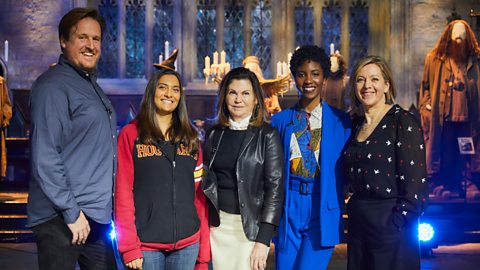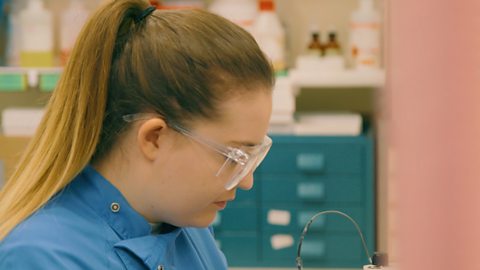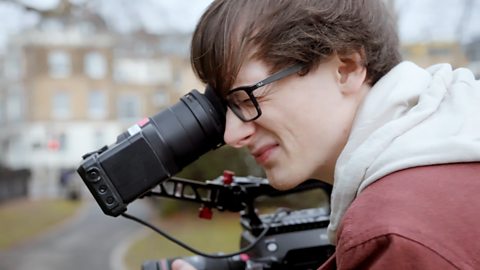Coming-of-age sitcom The Young Offenders began on BBC Three and has had three successful series, but what goes into making the show?
The Young Reporter team went behind the scenes of some popular BBC brands to find out which jobs go into making hit content.
Join actor Jennifer Barry, music supervisor Dina Coughlan, foley artist Eoghan McDonnell and make up lead Edwina Kelly for a sneak peek behind the scenes.
Jennifer Barry, actor
There are up to 150 other people that work behind the scenes to make the show happen. This can be from producers, to costumer designers, to hair, to make-up, to sound, to lighting, to camera work. The work is non-stop behind the scenes and it’s what brings it all together and makes it perfect for the final show.
Jennifer's top tip
For anyone who wants to be an actor, just go for it. Have the belief in yourself and take every single opportunity you can get. Work hard and don’t doubt yourself because you can do it.
Jennifer Barry
My name is Jennifer Barry. I'm 20 years old and I'm an Irish actor mostly known for my role as Siobhan Walsh in The Young Offenders on BBC Three.
So, The Young Offenders is not just the two boys, it's not just myself and Linda. There are up to 150 other people that work behind the scenes to make the show happen. This can be from producers to costume designers, to the hair, to make-up, to sound, to lighting, to camera work. The work is non-stop behind the scenes and it's what brings it all together and makes it perfect for the final show.
I always wanted to be an actor from a young age and how I got into the show was actually purely by chance. I saw a newspaper article on Facebook and I looked into it and said they were looking for people to audition for the show and I said "you know what, I'll just go for it". And that would be my advice for anyone who wants to be an actor – just go for it. Have the belief in yourself and take every single opportunity you can get. Work hard and don't doubt yourself at all because you can do it. That was how I got the role of Siobhan Walsh in The Young Offenders and my life has never been the same since!
So, for a regular day as an actor, we'd wake up roughly around half four or five a.m. in the morning, we get collected and we're brought to base. And at base we get these little sheets with lines for the day on them called "sides" and you read through the sides and go over your lines and while that's all happening, you're having your breakfast, you're going into make up, then you're getting into your costume, then you're getting your hair done as well. And then you're still to trying to learn your lines between all that and then, once that's done, you're brought to set. One scene alone can take up to five hours to film so it is a very intense day but, apart from that, it is a lot of sitting around and waiting around while the camera's move their angles and the lights are adjusted and the sound is edited, and then you'll have lunch and you'll go back to filming and then you finish up at around six or seven and by the time you're back you get an email with your lines and with the schedule for the next day. So, it is very, very on top of your game all the time.
I suppose what makes me work well in comedy is the fact that I always laugh at myself. Not in terms of finding myself hilarious – I laugh at myself so that other people can't laugh at me but laugh with me. And that's the secret to comedy.

Dina Coughlan, music supervisor
As a music supervisor my job is the get the rights to use any commercial music … and working with the producers to find existing music to be on the soundtrack. The fun part is finding songs that you think are going to work well.
Dina's top tip
If you do have a passion for music, but you're interested in another area like law or accounting, you can potentially marry those two areas together because there are production companies and record labels where you have lawyers dealing with copyright and accountants who are also involved.
Dina Coughlan
Hi, my name is Dina Coughlan and I am a music supervisor on The Young Offenders.
When I was in secondary school, I'd say probably one of my favourite classes was my Drama class. I had a really great teacher for that class. For me, I really tended to excel a bit more when I went to university and I was engaged with my classes and my classmates and instructors.
So, I started working in the music industry and was able to take those skills and transition into music supervision. I relocated to Ireland about six years ago and have been working on various film and TV projects since I moved here and one of the first projects was The Young Offenders film. So, as a music supervisor, my job is to get the rights to use any commercial music that is used in the series. So, that could be whenever there may be a visual vocal where a character is singing a song in an episode. My responsibility is to make sure that they have the rights to use that song within the series. Also working with the producers and the directors to find existing commercial tracks to use as part of the soundtrack of the series and the episode. So, I think the fun part of it is just finding songs that you think are going to work well in an episode and collaborating with everybody on those ideas and seeing how things take shape.
So, I think if this is an area that anybody is interested in, I think, obviously, the biggest thing is that you love music. And you don't have to be a musician – I'm not a musician. If you do have a passion for music and you're interested in music, but you also are interested in another area, like law or accounting, those are areas that you can potentially marry those two interests together because, you know, at film production companies, at record labels, there are lawyers who're dealing with IP, you know, copyright and you have accountants involved in working at a record label and working at film production companies. So, you can take those interests and marry them together with your interest in music as well.

Eoghan McDonnell, foley artist
Foley is re-recording sound effects in a studio environment. So it's re-recording footsteps and things that characters might do.
Eoghan's top tip
If you want to have a go at doing some foley, record yourself walking down the hallway with the jacket on. Try and replace the footsteps and jacket afterwards. Have fun with the sound effects and you’ll get a good idea of the process.
Eoghan McDonnell
I always had an interest in sound and in music in particular. Since I was in school really and I went to college and I trained in a verybroad media degree, but it was a practical media degree and that led me to realise that there was potential in the film industry forsomeone who was interested in sound in general. I approached a lot of people and I eventually got some work experience in Ireland's only film studios, in Ardmore Studios, and that led me to an internship essentially there, over a couple of years I luckily gottrained in how to do it.
Foley is, it's re-recording sound effects within a studio environment. So, it's re-recording footsteps and things that the characters might do so it allows the sound mixer to take out the dialogue track and then they're left with this track of organic sound effects that would be there with the dialogue but with the dialogue gone. So, all BBC dramas require foley soundtrack, because they're sent around the world and they need foreign languages dubbed in, cos you have to think internationally when you're dealing with post-production.
With Conor and Jock, one of their main things is they're wearing a kind of like a jacket like so we'll cover the jacket moves whenever necessary. And just try and make it a bit more fun. So, we use a lot, we used a lot of, a lot of gooey things. So, I think if you ever hear them when they throw the bike on the ground and run off that's us kind of just adding a bit of drama and a bit of weight. One of the main things for goo and stuff and blood is just a simple cloth. Blood will be like dripping sound. Another thing is, if you're doing dog feet or any kind of animal feet, just put on some gloves. If you put paper clips on the top of your gloves and use duct tape and stick some paper clips if you want to mimic what a dog sounds like on wood or something, I just have a table here, but you just lightly taps hands on table. I'm aware I have a "doing foley face" haha – concentration! Then there's the classic snow. It's like cornflour in a bag. So, just cornflour you buy in the shop sound of walking on snow. You get that kind of sound. If you wanted to have a go at doing foley yourself, record a short video of yourself walking down a hallway with a leather jacket on and then try and replace the footsteps and a leather jacket afterwards and put yourself in silly shoes with a squeak or something like that and a leather jacket that sounds really over the top and have fun with it. I think you'll enjoy doing that and you'll get a good idea of the process.

Edwina Kelly, make up lead
Being a make-up artist isn't all about putting make-up on people. If you want to work in tv and film, there's a lot more to it such as making sure you have enough products for the cast and keeping an eye on the budget to ensure you're not overspending.
Edwina's top tip
There is a lot of information out there, where you can watch tutorials etc. You do have to have a flair for make-up but it's all about practice. Remember, make up isn't permanent so if you put a dodgy eye liner on someone and it doesn't work, you can take it off!
Edwina Kelly
My name's Edwina Kelly and I was the key make-up artist on the latter half of the third season of The Young Offenders.
When I was at school, I wasn't particularly academic. I much preferred the practical side of school. The subjects I loved alwayswas Art. That was my favourite one and Biology. I was definitely more of a practical rather than an academic student.
Basically, when I finished school, I went to Art college. So, there I studied a Design certificate. So, it was two years and it was specifically for make-up for TV, film and theatre so that was really my launch into the industry and then, once I got into the industry, a lot of the times it's making your contacts. It's who you know and then, if they know you, they give your name and it snowballs.
So, basically a typical day on The Young Offenders would start at about 06:45 in the morning and that hour in the mornings is basically for cast to go through, we call it go through "the works" which is going through hair and make-up and wardrobe. It's all very tightly timed. So, if you're given 20 minutes to do someone's make-up, it has to be 20 minutes! And then, because I was key make-up, there was times where I wasn't always on set because, you know, being a make-up artist is not all about just putting make-up on people. If you want to work in TV and film, there's quite an awful lot more to it, to keeping the departmentrunning. So, I needed to make sure that I had enough products for all the cast and I had to keep in mind the budget as well to make sure I wasn't overspending. So, you need to be constantly running all that in the background as well, and then you need work with the second assistant director to work out the timings for the next day to make sure that I had enough time to get all the actors ready in the morning, so you're doing all that between going in and out to set and then you would finish at about seven o'clock in the evening. So, yeah, pretty jam packed!
There's so much information on YouTube with little tutorials and information that you can just start practising some looks. Make-up is something that you can, you do have to have a flair for it but just by practising and playing around and having fun is a really important part of it and it's not permanent so if you do some dodgy eyeliner on your friend it doesn't matter, you can take it off and you can start again.

Making the Magic: Inside jobs in film. collection
Are you spellbound by the Wizarding World films? Meet the people who work in the film industry and make the magic happen.


